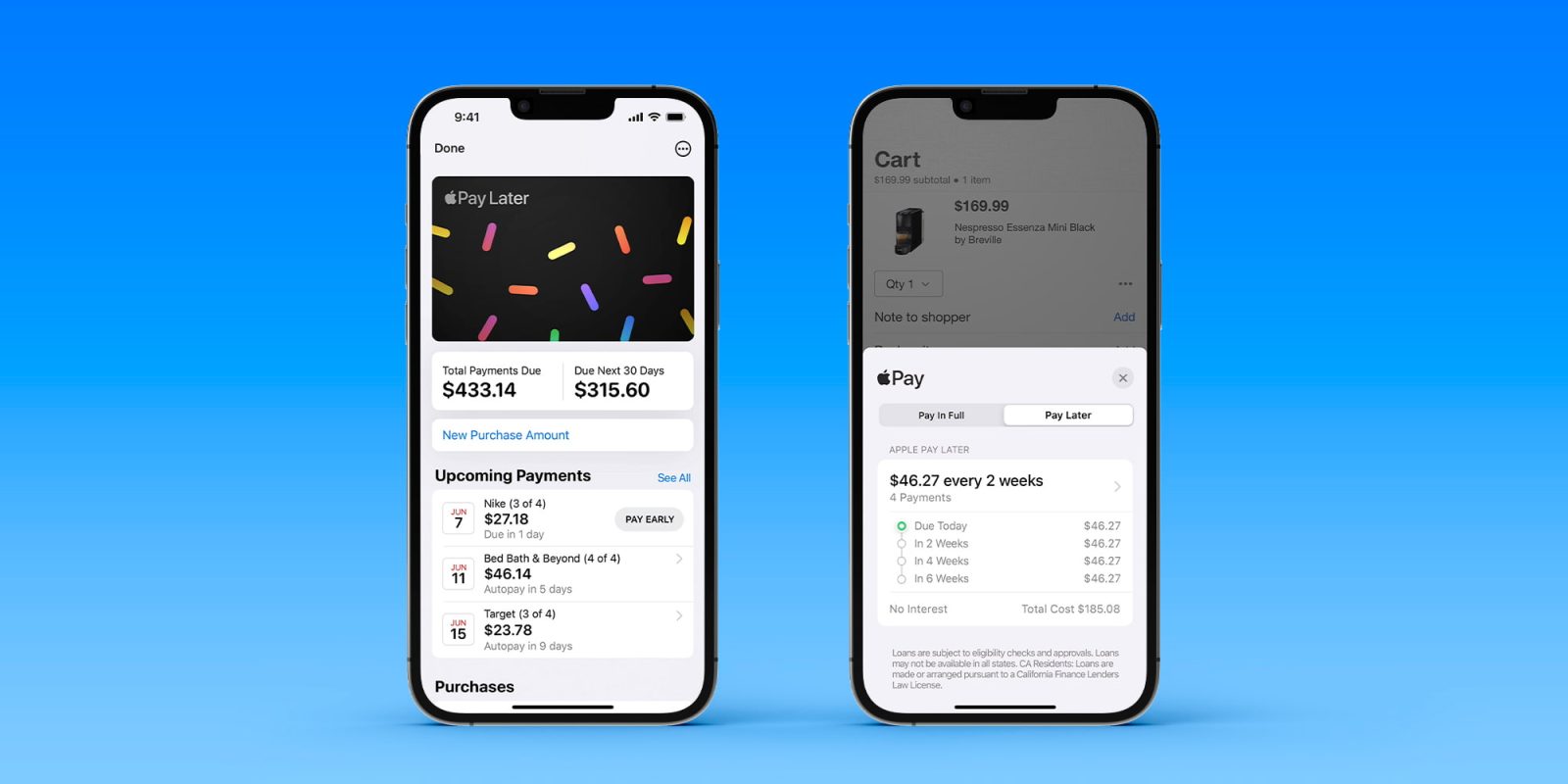
We first learned about plans for Apple Pay Later almost a year before the company announced the new installment payment plan at WWDC. While no interest or fees are charged, a report today says that Apple will still make money from the service.
A business school academic has also warned consumers to be cautious about using the option …
Background
Apple launched a 0% financing scheme back in 2019, but that was limited to iPhone purchases, and only available to Apple Card users. It was later extended to other Apple products, but again for cardholders only.
Apple Pay Later
Apple Pay Later is a completely new offering. It offers installment payments for literally any product or service you buy using Apple Pay.
Apple Pay Later provides users in the US with a seamless and secure way to split the cost of an Apple Pay purchase into four equal payments spread over six weeks, with zero interest and no fees of any kind.
Built into Apple Wallet and designed with users’ financial health in mind, Apple Pay Later makes it easy to view, track, and repay Apple Pay Later payments within Wallet. Users can apply for Apple Pay Later when they are checking out with Apple Pay, or in Wallet.
Apple Pay Later is available everywhere Apple Pay is accepted online or in-app, using the Mastercard network
The option is, however, limited to paying over just six weeks – rather than the two years you get on Apple products using an Apple Card.
How Apple makes money
With 0% interest and zero fees, it might seem that Apple won’t make any money from the financing scheme, but business school associate professor Rajat Roy says that this isn’t the case, as he explains in The Conversation.
Apple is trying to consolidate its foothold in the world of consumer finance, and increase its profitability […]
As Apple’s customers increasingly start to use the Pay Later service, it will gain from merchant fees. These are fees which retailers pay Apple in exchange for being able to offer customers Apple Pay.
While the fees are relatively small, they exceed the financing cost of offering credit for such a short period. Roy says that Apple and its financing partner Goldman Sachs will also gain valuable spending data.
Apple will also gain valuable insight into consumers’ purchase behaviours, which will allow the company to predict future consumption and spending behaviour.
Consumers should be cautious
While the deal may seem a good one for consumers, Roy says that pay-later schemes involve two risks.
First, potential impact on your credit rating. While Apple only does a ‘”soft” credit check when you ask to use the service, which doesn’t show up as a loan on your credit reports, you can still harm your credit score if you miss a payment.
Second, Roy says that such schemes can encourage spending that isn’t sustainable.
Younger demographics (such as Gen Z and Millenials) and low-income households can be more vulnerable to the risks associated with using these services – and can rack up debt as a result.
Purchases through buy now, pay later schemes may also be driven by a desire to own the latest gadgets and luxury goods – a message pushed onto consumers through slick marketing. They can condition consumers to make purchases without feeling the pain of parting with cold, hard cash.
From a consumer psychology perspective, these services encourages immediate gratification and put younger people on the consumption treadmill. In other words, they may continually spend more money on purchases than they can actually afford.
Affirm ‘not worried’
Popular “pay later” credit provider Affirm’s CEO Max Levchin claimed on Bloomberg TV that he’s “not worried” by Apple’s announcement, even though the company’s stock dropped 5.5% on the announcement. Indeed, Business Times notes that he argues the company may even benefit.
“I don’t think there’s much concern,” Levchin said Tuesday (Jun 7) in an interview on Bloomberg Television. “There’s a lot of room for growth for all involved.” Buy now, pay later is used for fewer than 5 per cent of US transactions, he said.
Affirm offers lending plans from 6 weeks to 60 months, compared with Apple’s plan to split up Apple Pay purchases over 4 payments across 6 weeks, Levchin said. The Apple service “creates a really nice tailwind for us” by informing more people about buy now, pay later services, he said.
Not everyone believes him.
FTC: We use income earning auto affiliate links. More.





Comments